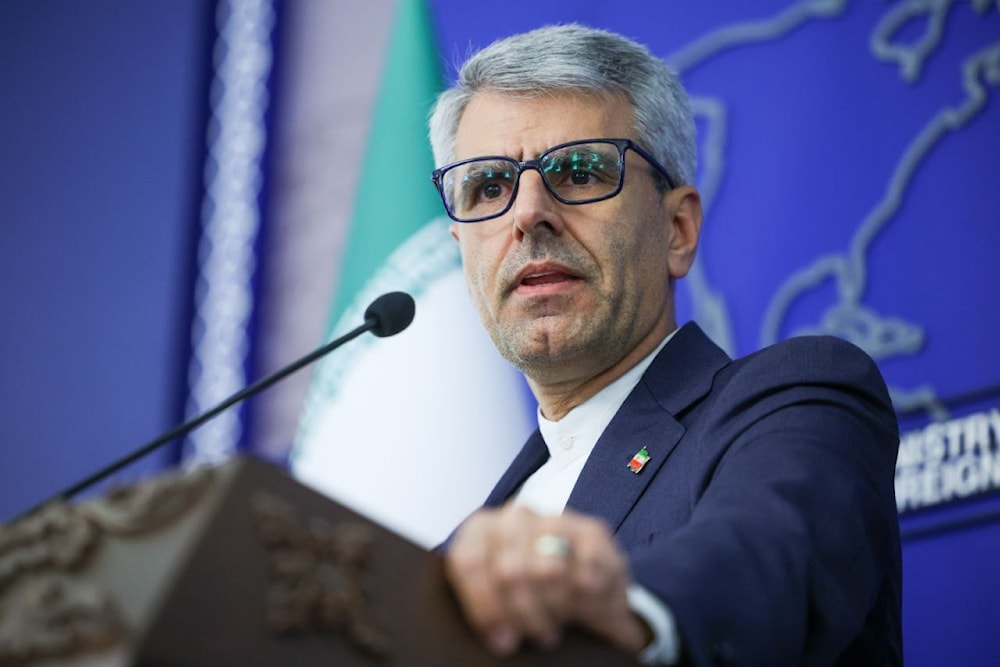Trump's letter under review, Iran to respond after assessment: Iran FM
Speaking to reporters, spokesman Esmaeil Baqaei mentioned that Tehran has no plans to make the letter public, noting that media speculation does not necessarily reflect its content.
-

Spokesperson for the Iranian Ministry of Foreign Affairs, Esmaeil Baqaei. (IRNA)
IRNA on Monday reported that Iran is reviewing a letter from US President Donald Trump and will issue a formal response once the assessment is complete. Foreign Ministry spokesperson Esmaeil Baqaei addressed the matter during his weekly press briefing in Tehran, nearly a week after the letter was received.
The correspondence, which Trump announced on March 7, was sent to Ayatollah Seyyed Ali Khamenei amid the administration's continued "maximum pressure" campaign on Iran, while also expressing an interest in negotiations.
Baqaei clarified that Tehran has no plans to make the letter public, noting that media speculation does not necessarily reflect its content. However, he stated that its overall tone aligns with Trump's previous public remarks. "Iran's response to this correspondence will be made" through diplomatic channels after a thorough review, he said, dismissing any connection between the letter and Foreign Minister Abbas Araqchi's visit to Oman, which had been scheduled in advance.
During the briefing, Baqaei criticized Washington's approach, arguing that its calls for talks are undermined by simultaneous sanctions on Iran's trade and industry. He asserted that genuine diplomatic engagement requires mutual respect rather than coercive tactics. "The US has a poor record in honoring its commitments, and seeks to misuse negotiations as a political and propaganda tool rather than as a means to resolve differences," Baqaei said.
Read more: Pezeshkian rules out US talks, tells Trump 'Do what you want'
Turning to recent US airstrikes in Yemen, Baqaei condemned the attacks and reiterated Iran's firm stance against any threats to its security and national interests. He dismissed US accusations that Iran is behind the Yemeni resistance, stating: "The people and government of Yemen independently conduct actions they deem necessary to support Palestine, which reflects their decision to back the legitimate resistance of the Palestinian nation."
Iran continues to engage in key diplomatic initiatives, including a trilateral meeting with China and Russia in Beijing to discuss regional stability and nuclear issues, as well as a visit by the deputy foreign minister to Vienna for discussions with the International Atomic Energy Agency (IAEA). Araqchi's trip to Oman, Baqaei said, was unrelated to Trump's letter. He noted that the recent Iran-China-Russia meeting, which was held for the first time at Iran's request, focused on strengthening multilateral cooperation and supporting international legal norms.
Baqaei also criticized the US for expelling South Africa's ambassador, calling it a suppression of pro-Palestinian voices. He argued that Washington's actions violate diplomatic norms and reflect broader efforts to stifle support for the Palestinian resistance. The spokesperson also denounced the Trump administration's travel restrictions on nationals from 43 Muslim-majority countries, labeling them discriminatory and a violation of international human rights standards. He said the inclusion of Iranian citizens in these bans illustrates Washington's hostility toward the Iranian nation and further fuels division between countries.
Read more: Trump administration weighs travel ban on 43 countries: Report
Iran is actively pursuing a case at the International Court of Justice (ICJ) to reclaim $2 billion in frozen assets held by the US. The legal action is based on violations of the 1955 Treaty of Amity, and Baqaei confirmed that Iran's Foreign Ministry and legal departments are closely monitoring developments. Addressing tensions on the Lebanon-Syria border, Baqaei expressed concern over recent clashes and warned that "Israel" stands to benefit from regional instability. He stated that Iran remains committed to preserving regional unity and countering any attempts to divide Islamic nations.
Reiterating Iran's criticism of the IAEA's political stance, Baqaei warned that it could negatively impact future cooperation. He also addressed concerns over Western efforts to trigger the JCPOA's snapback mechanism, arguing that such a move serves only to escalate political pressure on Iran rather than fostering diplomatic solutions.
When asked about US threats to reduce Iran's oil exports to zero, Baqaei recalled historical instances of American intervention in Iran's economy, including the Anglo-American coup during the nationalization of Iran's oil industry. He noted that Iran remains determined to resist economic pressure and continue developing its national economy.

 4 Min Read
4 Min Read








